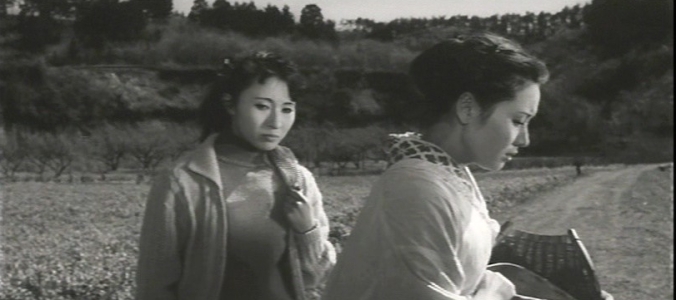Stolen Desire as a title suggests an overheated romantic melodrama.* Instead, it is one of the most entertaining back-stage comedies you’ll come across in any language.
Shinichi is a young man who has somehow gotten himself attached to the low-rent Yamamura acting troupe, which tours the countryside with crudely abridged versions of Kabuki plays and the added attraction of a “Tokyo style strip show.” We

The strip show, not so daring since it stops with tops and bottoms both still intact.
first meet them in a disastrous visit to Osaka, where the all-male audience walks out after the dancers are finished, leaving the actors to play to an empty tent.
Bankrupt, they regroup and take off for the boondocks. No one really understands why Shinichi, who has a college degree, is with the troupe, since he doesn’t act. The subtitles rather misleadingly call him a “director,” but he is really a prop man and stage manager, as much as any such troupe can be managed. The real “director” is of course Mr. Yamamura, who plays the classic roles, while his two daughters play the female roles, and a son-in-law plays heroic roles, with a handful of others fill out the company. The actors all know their roles from hundreds of wildly abridged and exaggerated performances, sometimes even mixing up the plays in mid performance. The very idea of a director is foreign to them.
Only when we reach the countryside do we understand that Shinichi is in love with  the eldest daughter, unfortunately also the one who is married. Meanwhile, the younger daughter Chigusa is in love with Shinichi, so much so that she even encourages her sister to sleep with him if that is what it takes to keep him around.
the eldest daughter, unfortunately also the one who is married. Meanwhile, the younger daughter Chigusa is in love with Shinichi, so much so that she even encourages her sister to sleep with him if that is what it takes to keep him around.
In the rural backwater, where almost no modern entertainment reaches, they find themselves treated like heroes. The crowds flock to the tent, the village girls throw flowers at the hero, the men whoop at the dancers and cheer the plays, and the single men in the company find lots of women of all ages willing to sleep with them. Just how remote the town is can be seen by the old woman who mixes up a dark brown concoction from “women’s herbs” and sells it to the audience as Coca-Cola.
There are the expected set of young rubes who try to catch the women undressing through holes in the tent and generally act as the yahoos you might expect, including an attempted rape of one of the actresses, so it is not all sweetness and light. But it is nevertheless often very funny, even though Shinichi’s love problem is taken quite seriously.
This is one of the director Shohei Imamura’s earliest movies, but it introduces themes and attitudes that would show up throughout much of his work, especially a particularly earthy yet non-exploitative approach to sex.
Shinichi is played by Hiroyuki Nagato, who would be one of the Japanese New

Hiroyuki Nagato
Wave’s favorite tortured young men, in films like Pigs and Battleships, The Warped Ones, or I Hate But Love, but would escape that early type-casting for a long, solid career. On the other hand, Chigusa is played by Michie Kita in what was apparently her only screen appearance, though she is both attractive and convincing.
Especially fun to watch is Ko Nishimura, one of Japan’s most dependable character actors who would make almost 200 movies dating from The Burmese Harp to the 1994 version of Chusingura. Here he is almost a lead as the least predictable of the company’s actors and a seducer (though his victim turns the table on him and makes him fulfill his promise to add her to the troupe).
There are of course lots of movies about barnstorming actors and troupes that are down on their luck. Films as varied as Sawdust and Tinsel, La Strada, or The Pirate spring to mind without much thought. The Japanese would turn to the topic fairly regularly — see, for example, Ozu’s Floating Weeds, made twice. But few are as rambunctious and entertaining as this one.
- Nikkatsu Studio apparently had a fixation on Desire in 1958. Within months, a nifty little heist film also directed by Imamura was marketed as Endless Desire.
Pingback: Things We Don’t See (II) | Japanonfilm
Pingback: Profound Desires of the Gods / Kamigami no fukaki yokubo (1968) | Japanonfilm
Pingback: Village / Harakara (1975) | Japanonfilm
Pingback: Warm Water Under a Red Bridge / Akai hashi no shita no nurui mizu (2001) | Japanonfilm
Pingback: Always: Sunset on Third Street / Always san-chome no yuhi (2005) | Japanonfilm